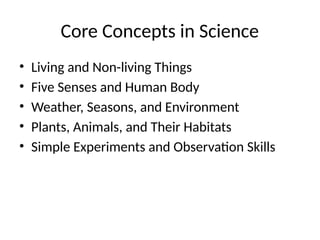Teaching_Core_Concepts_in_Course_Subjects.pptx
- 1. Teaching Core Concepts in Course Subjects • Effective Approaches for Grade 1 & 2 Classrooms • Focus on Literacy, Numeracy, Science, and General Knowledge
- 2. Core Concepts in English • Phonics and Letter-Sound Recognition • Vocabulary and Sight Words • Sentence Formation and Grammar • Reading Comprehension and Story Retelling • Speaking and Listening Skills
- 3. Instructional Strategies - English • Phonics games and flashcards • Word walls and interactive boards • Story maps and picture sequencing • Group storytelling and puppet play
- 4. Core Concepts in Mathematics • Number Sense and Counting • Addition and Subtraction • Shapes, Patterns, and Measurement • Place Value and Comparing Numbers • Time, Money, and Problem Solving
- 5. Instructional Strategies - Mathematics • Hands-on manipulatives (blocks, counters) • Math songs and games • Real-life problem scenarios • Number lines and ten frames • Sorting, matching, and building patterns
- 6. Core Concepts in Science • Living and Non-living Things • Five Senses and Human Body • Weather, Seasons, and Environment • Plants, Animals, and Their Habitats • Simple Experiments and Observation Skills
- 7. Instructional Strategies - Science • Nature walks and sorting games • Use of real objects and visuals • Songs and rhymes about body and senses • Science journals and drawing findings • Simple class experiments (e.g. sink/float)
- 8. Core Concepts in General Knowledge • Myself and My Family • Community Helpers and Safety • Transport, Places, and Culture • National Symbols and Festivals • Rules, Responsibilities, and Manners
- 9. Instructional Strategies - General Knowledge • Role plays and dramatization • Thematic displays and bulletin boards • Community walks and visits • Storytelling and question circles • Art and craft-based projects
- 10. Conclusion: Teaching Core Concepts • Use child-friendly language and real-life examples • Encourage curiosity, creativity, and collaboration • Make learning active, hands-on, and visual • Assess learning through games and conversations









